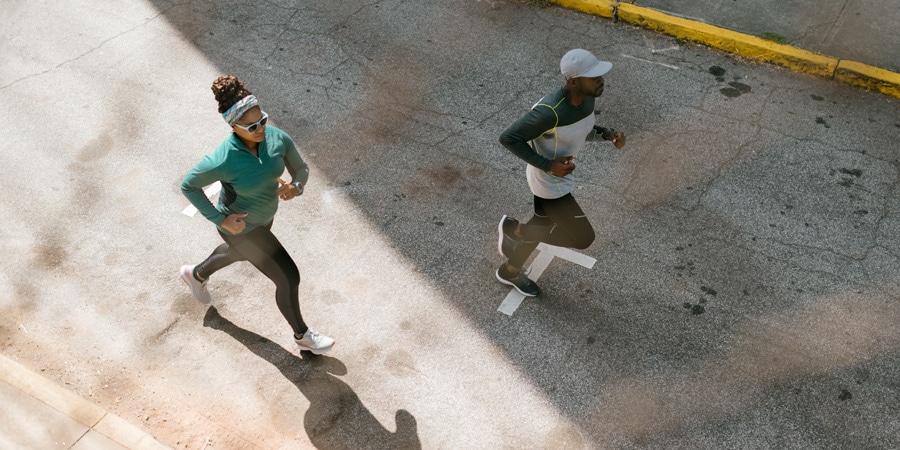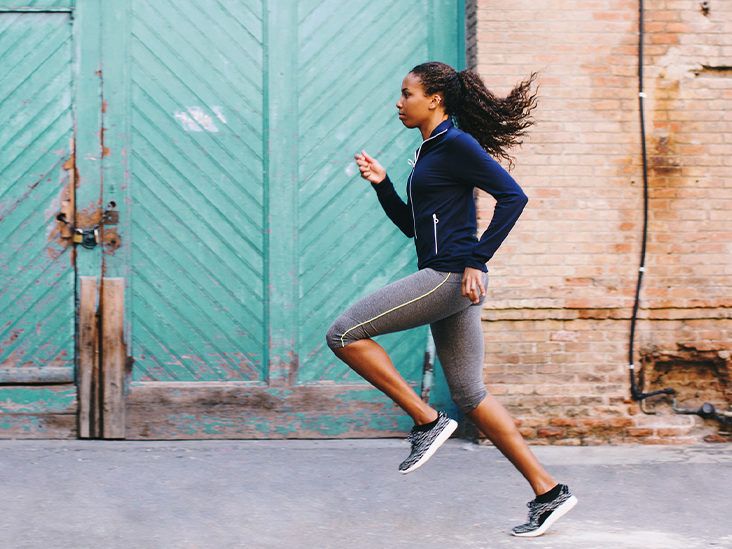
Because of the pandemic-filled ubiquity of open air exercises, a ton of individuals have chosen to evaluate the advantages of running for themselves. Whether these are novices binding up interestingly or individuals getting back to the game after a break, the draw of running has grabbed hold on a developing level of our populace.
As a matter of fact, as per a new review by World Games, the overseeing body for the game of olympic style events around the world, almost 3 out of 10 individuals from the US currently see themselves as sprinters, with plans to stay with it for a long time to come.
So what's behind the push to raise a ruckus around town, treadmills, and trails? Everything shifts: There's not one specific force that drives all sprinters — it's far more individualized. At times, sprinters are spurred by the opportunity to gather some bling toward the finish of a race, indent another individual best time, win an age-bunch grant, or fit the bill for another occasion, like the Boston Long distance race. In any case, even those attracted to running's cutthroat side are seeing there's something else to acquire besides speed and wellness. Around three fourths of sprinters On the planet Games overview concurred with the assertion "Running is great for my brain as well as my body."
For sure, the advantages of running range both physical and mental. What's more, they exist for all sprinters, whether or not you decide to race or couldn't care less about your speed, or whether you log your miles every single day or you pull on your tennis shoes just when the state of mind strikes. We'll get into those advantages in a couple, yet before we do, there are a few things you ought to remember prior to beginning another daily practice — particularly on the off chance that you haven't been a sprinter previously — so you can make the most out of every one of these advantages.
What do you need to know before starting running?

Running is straightforward, however there are a couple of key contemplations for beginning another running system. For a certain something, legitimate gear assumes a bigger part here of activity than it might in different sorts.
The right shoes matter a ton with running: You'll create a ton of power with each step, so you need to pick a couple of running shoes that are steady and agreeable. It's frequently extremely supportive to visit a specialty running store to take a stab at a couple coordinates so you can see what feels ideal for you, as SELF revealed beforehand. (On the off chance that you don't have a decent running retailer close by, picking an internet based outlet with simple returns would be a strong choice as well.) You likewise need to pick a games bra that offers you enough help for high-influence action, as well as a portion of these running basics to make your exercise more agreeable and viable.
And afterward there's security. Contingent upon factors like area or race, certain individuals may not have a real sense of reassurance running without anyone else or at specific seasons of day — or may feel like they will be unable to practice outside by any stretch of the imagination. (One thing that can help in low light is gear to make you more apparent to vehicles, however different issues, as fundamental bigotry and absence of admittance to safe outside spaces, require all the more long haul arrangements nobody individual can give all alone.)
Movement is enormous as well: Whether you're doing it outside or on the treadmill, since running is high effect, it's ideal to begin gradually and step by step increment your mileage over the long run. One effective method for doing this is to begin strolling — say, for 30 minutes, 3 times each week. From that point, include brief timespans, Subha Lembach, a confirmed running trainer in Columbus, Ohio, who works with numerous new sprinters, tells SELF.
Over the long run, you can bit by bit build your quicker stretches until you're running constantly. Then you can gradually increase how much time you run or the distance you're covering. As you do, it's smart to consolidate broadly educating and strength preparing to keep your body in balance and stay away from abuse wounds like shin braces or stress cracks, Lembach says.
Whenever you have the fundamentals down, you can begin running — and receiving the rewards of it for your body, psyche, and soul. The following are 15 constructive outcomes of running amateurs and prepared sprinters the same should remember.
1. Running strengthens your whole musculoskeletal system.

On the off chance that you're considering how running helps your body, indeed, the response is a ton. So it's not shocking that a large number of the advantages of running that we'll discuss are physical.
Furthermore, they're not all cardiovascular by the same token. While running is a high-impact work out, it additionally can assist you with getting more grounded, especially in your lower body. A finely tuned ensemble of lower-body muscles — including your quads, hamstrings, calves, and glutes — power you not too far off or up slopes, Rhianna Green, DPT, a New York City based actual specialist and sprinter, tells SELF. Furthermore, assuming you increase the power on those slopes, you might get much more strength benefits. A recent report affirmed that there are genuine slope run benefits: When soccer players performed 10 runs of 10 seconds on a 7% grade two times every week for quite a long time, they saw critical enhancements in their leg and back strength. Chest area and center muscles assume a part in running proficiency as well.
Furthermore, those aren't the main body parts you're reinforcing, Megan Roche, MD, a running trainer and doctor, tells SELF. Your ligaments, tendons, and bones likewise adjust to the beating of running by building flexibility. Bone strength is especially significant, since starting in menopause, hormonal movements make bone thickness decline, expanding your possibilities of osteopenia (debilitating of your bones), osteoporosis, and cracks, says Dr. Green.
Up through your 20s, weight-bearing activities like running can assist you with expanding your pinnacle bone thickness. A while later, running assists you with keeping up with the thickness you have and diminish the rate at which it leaks away as you age. "The human body is this instrument that we can use for development for a really long time, and having that more grounded establishment, as far as I might be concerned, is extremely cool," Dr. Roche says.
2. It may improve knee health.
Certain individuals have a careful outlook on beginning running due to the gamble of injury — especially, the conviction that it'll wreck their knees. Research, in any case, doesn't back that up.
Over the long haul, research proposes running doesn't build the gamble of joint inflammation, basically for individuals who run at a sporting level. As a matter of fact, a 2017 meta-investigation of 25 examinations presumed that sporting sprinters were less inclined to foster knee joint inflammation than inactive individuals (or expert/tip top sprinters) were. What's more, one little 2019 review distributed in BMJ Open Game and Exercise Medication of 82 long distance runners even found long distance race running better a few parts of knee wellbeing in moderately aged sprinters, maybe by lessening irritation in the joint. (However, it additionally discovered some asymptomatic wearing of ligament at the edge of the knee in a portion of the sprinters.)
Knee torment will in general be a typical grumbling among the sprinters Dr. Green finds in her office. As a rule, there's a generally straightforward fix, she says: fortifying your legs and hips (like with this sprinter centered strength exercise), changing shoes each 500 miles or somewhere in the vicinity, and changing around the surfaces you run on (like investing some energy in milder paths or grass notwithstanding hard concrete). At times, however, prior difficult circumstances like knee osteoarthritis, joint substitutions, or bombed upper leg tendon reproductions could mean you ought to think about an alternate game.
3. Running can improve heart health.

At any point can't help thinking about how long to run for? Indeed, in the event that you're hoping to help your heart wellbeing, it may not be however much you might think.
Government rules suggest 150 minutes of moderate-power action or 75 minutes of incredible movement each week (or a mix of the two) for ideal cardiovascular wellbeing. No matter what your speed, running fits that vivacious bill, importance there are slow running advantages as well as remunerations to hustling.
As per a survey distributed in the Mayo Center Procedures in 2015, you probably won't have to invest that much energy out and about by the same token. Sprinters who went out a few times each week, for a sum of six miles or less, received as numerous heart wellbeing rewards as long distance runners.
It seems OK — all things considered, your heart's a muscle as well, Dr. Roche says. Similarly as you would see more muscle in your quads and calves as you run, you can envision your cardiovascular strength expanding. A more grounded heart can siphon more blood out with each thump, making your whole cardiovascular framework considerably more proficient and strong.
4. Running can reduce your risk of many other chronic diseases.
Left untreated, hypertension can prompt cardiovascular failures, stroke, vision misfortune, and other medical problems, as indicated by the American Heart Affiliation. Drug can help, yet running can assist with bringing down it as well: A 2020 examination survey in the diary Sports Medication closed a customary running propensity decreases resting systolic circulatory strain (the top number) to the tune of around 4.2 mmHg. (Note: skirt no medications without talking with your primary care physician, yet some might allow you to attempt way of life changes previously, or as well as, attempting medicines.)
Concentrates likewise show an entire host of other medical advantages of running, as running trainer, tip top sprinter, and general wellbeing expert Kaitlin Goodman, MPH, tells SELF. You might bring down your gamble of diabetes, respiratory illnesses, and a few malignant growths, maybe by working on your body's capacity to control blood glucose and diminish irritation.
5. Running can anchor a whole host of healthy habits.
One of Dr. Roche's areas of examination includes way of life ways of behaving — people decisions consistently about things like sustenance, rest, and exercise. "One of the greatest things is signal support," she says. "There's this fountain that, when you find this way to get out the way to run, it makes a portion of the other positive ways of behaving simpler."
All things considered, when you're raising a ruckus around town routinely, you'll most likely ponder how you're energizing your miles. Furthermore, you're probably going to focus on making a beeline for bed prior on the off chance that you've set an early-morning caution for your run. Pretty soon, you might procure what Lembach calls a "sprinter's character" and wind up organizing your days and schedules around when you can get out the entryway and how you can feel your best when you arrive.
6. Running can improve your mood.

Nervousness, misery, stress — assuming that you're feeling them all in full power nowadays, you're in good company. The American Mental Affiliation's latest report on pressure in America found around 33% of grown-ups said they felt totally wrecked by pressure most days, and one out of four find it hard to work accordingly.
Running (or any type of activity) isn't a fix all, and some of the time meds or treatment are likewise required. Be that as it may, as a 2020 survey of 116 examinations in the Worldwide Diary of Natural Exploration and General Wellbeing brings up's, major areas of strength for there running could be a powerful method for aiding address numerous emotional well-being difficulties. That is given, the creators caution, that it doesn't turn into a urgent need to work out.
7. Running may help you cultivate mindfulness.
One way running applies its mental power is through care — the act of tuning into the present. Particularly on the off chance that you abandon your earphones, something Philadelphia-based running trainer Vanessa Peralta-Mitchell suggests accomplishing for in any event a portion of your runs, it could be the one season of day you're not completing 50 things without a moment's delay.
When sprinters tap into this psychological lucidity, they're frequently constrained to look for a greater amount of it — Dr. Roche says she frequently sees competitors become inquisitive about reflection after they've been reliably logging miles for some time.
You can elevate this experience by utilizing "sensate concentration," Karen Bagley, PhD, MPH, a therapist at Energy Brain science and Execution in Woodbridge, Virginia, tells SELF. Give careful consideration of what you hear, contact, feel, smell, and taste on your course. That can assist with hauling you out of an inner state where you may be encountering a great deal of pressure, she says.
8. Running can boost your brainpower.

With age, cerebrum tissue — like bulk — normally starts to contract, expanding your gamble of mental deterioration. Be that as it may, the more vigorously fit you are, the more dim matter you'll hold, as per a new report in Mayo Facility Procedures.
9. You might sleep more soundly at night.
Psychological wellness conditions like pressure and uneasiness can likewise disrupt a decent night's rest. A running daily schedule, in the interim, can assist with facilitating your thrashing around.
"Exercise can develop your rest, further develop your general rest quality, and is demonstrated to assist with sleep deprivation," says Shelby Harris, PsyD, overseer of rest wellbeing at Sleepopolis and creator of The Ladies' Manual for Defeating A sleeping disorder. "No less than 20 to 30 minutes of cardio a day can assist you with nodding off quicker at night and diminish daytime weariness, so you feel more stimulated during the day."
One admonition: For some individuals, energetic activity around evening time lifts their pulse, internal heat level, and adrenaline levels, making it more challenging to float off. Expect to leave somewhere around four hours between your last mile and sleep time, Dr. Harris recommends.
10. Running gives you practice setting goals, achieving them, and celebrating them.

Running offers sufficient chances to lay out an objective and take the plunge. Perhaps you need to go farther than you at any point have, run a mile three days every week for a month, or get your quickest time in an in-person race or virtual test.
Arriving will require separating a major objective into bit by bit processes. "That expertise makes an interpretation of intellectually into different things — say, if you need to begin a business or a new position," Peralta-Mitchell says.
.


